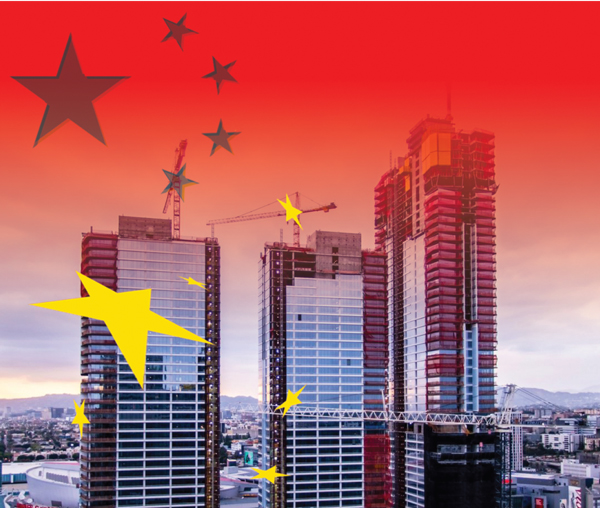 There’s no disputing that the super-charged investment boom in L.A. trophy projects from Chinese players is in the rearview mirror. Wanda Group has sold off its $1.2 billion One Beverly Hills project, while Oceanwide Real Estate has halted construction on its billion-dollar development amid refinancing issues.
There’s no disputing that the super-charged investment boom in L.A. trophy projects from Chinese players is in the rearview mirror. Wanda Group has sold off its $1.2 billion One Beverly Hills project, while Oceanwide Real Estate has halted construction on its billion-dollar development amid refinancing issues.
And today the flow of Chinese capital has been reduced to a relative trickle. In late 2016, the Chinese government imposed a series of new rules aimed at curbing its overseas spending. Since then, the inflow of money from China has dropped dramatically. It peaked in 2016 in Los Angeles at $1.5 billion but fell to $211.8 million in 2018, according to Real Capital Analytics (RCA).
But now, rather than pouring cash into the big shiny trophy projects of yesteryear, the Chinese money that’s still coming into the county is going toward the less glamorous industrial and multifamily properties, sources said.
But did the flow of Chinese cash decrease sharply, or has most of it been forced through alternative channels? It could be the latter, according to some industry insiders, who note that other countries, such as Singapore, have increased their investments in L.A. — potentially sourcing some of that cash from Chinese partners.
“The real flows from China are almost certainly larger,” said David Bitner, head of research at Cushman & Wakefield. “They just may not be screaming at you that they are Chinese capital.”
It’s possible that Chinese firms with multiple, international operations are now moving capital out of those other countries and into the U.S, according to Stephen Cheung, executive vice president of L.A. County Economic Development Corporation and president of World Trade Center Los Angeles. So, while they might not be able to get the money out of China, they can still sell assets in other regions or use joint-venture partners in other countries to funnel some of that money to L.A.
“They are using whatever vessel they can to get in the U.S.,” Cheung said. “They’re still investing — they’re just not investing $1 billion.”
In the past two years, Singapore investors have spent more than half a billion dollars — $515.3 million — on L.A. real estate, according to data from RCA, which tracked investments by foreign-owned firms that bought properties or portfolios of $2.5 million or more. Those were the first two consecutive years of $150-million-plus investment from the country since 2007.
“It may be that some of the funding behind Singapore-based vehicles could well be Chinese,” said Liam Bailey, head of research for Knight Frank. Foreign purchases can be “slightly obscure,” he added.

One source, speaking on the condition of anonymity, said he’s “not surprised to see Singaporean acquisitions increase at such a time when there’s more capital controls in China.”
“There’s very much a possibility that Chinese capital is being redirected through Singapore because Singapore is a major capital center in Southeast Asia,” he said.
Economist Marci Rossell said there’s always going to be “leakage.” “Whether it’s in China, Greece or [the] U.S., companies and individuals will always find ways to do what they want with their money,” she added.
Industrial strength
As the Chinese investment in mega-projects has flagged, its investment in industrial real estate has spiked.
Industrial real estate, also known as logistics, has been a magnet for investors in the last few years amid the e-commerce boom. That’s translated into high demand for last-mile fulfillment spaces, warehouses, and storage and distribution facilities.
By the end of 2018, Chinese investors had poured $125.7 million into the industrial market in the county, data shows. That’s nearly 570 percent more than the mere $19 million invested in 2016 and about 850 percent higher than industrial investment in 2014.
Much of that is due to the fact that the industrial market in L.A. is the strongest in the country, propelled by tight vacancy rates and high demand. For Chinese investors, it’s become a welcome alternative to the unpredictable billion-dollar high-rises they were used to building.
“Foreign investors see the logistics market in the U.S. as a very safe haven,” said Barbara Perrier, a vice chairman at CBRE based in L.A. “People are understanding that industrial is being driven by e-commerce — it is less risky as tenants don’t roll over as much.”
One reason for the uptick is a loophole in the regulations, experts said. Although the Chinese government now limits the amount of money private investors in China can spend overseas on property and other personal acquisitions, there are exceptions. Bailey said those exemptions require “a valid business requirement.”
Still, Cheung warns, any investment would be subject to strict supervision, so it’s unlikely that this provision would be abused.
Oceanwide’s fate
As the Chinese divert their money to more mundane properties, it’s difficult to ignore the flashy towers they left scattered around the city, a symbol of the gangbuster years of Chinese investment and influence that will last for decades.
At Oceanwide Plaza, the stalled cranes and lingering construction fencing are impossible to ignore. Facing $100 million in construction liens, the project has been at a standstill since February.
Some residents fear that Oceanwide Real Estate will leave the husk as is, but industry experts remain confident that the developer will secure the financing necessary to complete the project.
Managing director of the Agency’s development group, Hana Cha, who worked with Oceanwide when the firm was first proposing the development, predicted that the firm “will figure it out,” either by bringing on a joint-venture partner or securing a construction loan.
“If they can’t get that done, the reputation of the entire organization is going to be tainted in the U.S., and I don’t think they’re going to do that,” she said. “They kind of hit an obstacle — a little hurdle — but they have too much on the line to trip up over this right now.”
Other experts wonder whether Oceanwide will seek to sell the half-built project, as Wanda Group sold One Beverly Hills or Greenland Group has shopped its towers at Metropolis. Several sources said they have heard of firms that are interested in purchasing the $1 billion development. A representative for Greenland declined to comment.
Yet that would be a lose-lose for the Chinese, said Xinyi McKinny, a former senior managing director at Cushman.
“The government’s goal is to control money outflow, not to pressure to sell at huge discounts,” she said.
—Dennis Lynch contributed reporting
